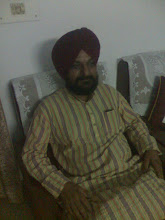Rajesh: http://kriticulture.blogspot.com/
We have been witness to universities mindlessly renouncing their true vocation, the pursuit of critical thinking, and reinventing themselves instead as factories of 'human resources' for an economy hurtling from crisis to crisis. More recently, projects have been undertaken to 'conserve' the Punjabi cultural heritage by video-recording the folk dances and songs (it is another matter if the dancers and singers happen to be university students). Do not such attempts to 'conserve' culture constitute a disavowal of the imperative to think culture in these difficult times? Moreover, by taking recourse to such conservation projects, do we not confine culture to enclaves? If we believe we can 'save' our culture by consigning it to the magnetic/laser tracks on discs, we are being cowardly and dishonest in the face of the challenge to think. Loads of disks may bury our guilt but cannot deliver us from it.
Sukhdev: http://languagecultureideology.blogspot.com/
The projects to video-record folk dances & songs may be attempts to document not to conserve the Punjabi Cultural Heritage.Secondly, folk dances and songs are part of intangible cultural heritage and the intangible heritage of a community is likely to change faster, more so if the given community is at the receiving end in the situation of a close cultural contact (read conflict). Every community (social group) lives within a cultural stream; it is often a smooth renewal of the past showing familiar texture. But the modes, methods & perspectives of development in the recent past have been such that the cultural diversity is threatened. In the age when we are talking, walking, and living globalization & consumerism, the cultural fabric, both tangible and intangible (buildings, sites, languages, robes, food, and everything), is changing very fast. So we as a community are in a flux. However it doesn't mean, we have no culture and we are not 'thinking culture'. What is happening is we are moving away from our cultural heritage but we are not living without a culture.
We may call it a cultural shift. The pressures of emerging life styles as a result of the operative methods & strategies of development moving us into the cultural shift and much of it is happening without any consent of the individual members of the community. That is the existential crisis of 'to be or not to be'; the crisis is not of those only who are on the margin but those also who are at the centre. Yes, the difference is there i.e. some are getting returns while facing the crisis but others are only facing the crisis.Whatever the differences, it is the similarity that has created the 'imperative to think culture'. Now the culture in which we are living, an imperative of our socio-economic development models, 'thinks' even the conservation of cultural heritage as a commodity or an avenue for employment. And as we live in a culture we have to follow its dynamism and paradigms of doing things. To preserve or conserve our cultural heritage is a way of relating, contextualising, not living it. We can conserve the tangible heritage but we can only document or archive our intangible heritage.But the documentation must be authentic.
Subscribe to:
Post Comments (Atom)





1 comment:
Agree with you fully in a sense we are passing through a transitory phase of Culture shift. Culture as such was never a static term and minor changes were always there. With changing times, culture too underwent a massive change. There were times when these changes were slow and these were accepted as norms of our society, but now we see remarkable changes and cannot decide whether to change in pace with the changes as seen in the values and morals. We I think are unmindfully following the other nations.Changes in the way we dress up to the things we wear as accessories and even the dietary habits are some remarkable changes. If we contain these changes to the level of what we wear and what we eat, it should be acceptable.Well that is not the case at all since within a span of a decade, our society has witnessed such radical changes in the basic morals and some behaviour patterns that they are a cause of emotional conflict between parents and children. The basic values of our society are balanced on such narrow banks that it is really difficult to decide whether we would be able to preserve the familial values and the ethics that we so dearly hold so close to our hearts and souls. A society that so strongly traces its roots in rich culture would accept such radical changes with great opposition or the members surely will have to live a life of a cultural deliema . Change is hard because people overestimate the value of what they have—and underestimate the value of what they may gain by giving that up. This unwillingness to change or accept changes on the part of the elders would widen the gap between the members of a family and the society at large.
If we all accept that change is the way of life and what cannot change with the change of time, becomes outdated and out-fashioned, we too would become outdated obsolete and useless. In times to come we cannot expect the changes to slow down, they in any case would be faster and more pronounced. Our success lies not in holding the ancient beliefs and taboos but change, and change faster than ever before.Change is necessary in life — to keep us moving ... to keep us growing.
Regards
Anu Lalli Behniwal
Post a Comment